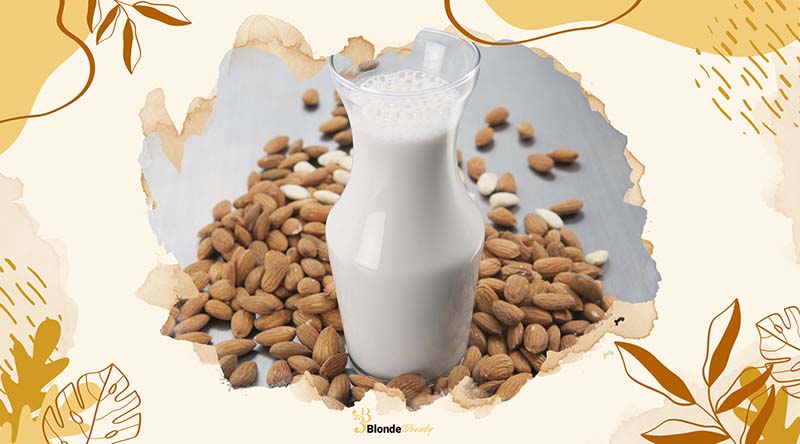Almond milk has gained significant popularity as a dairy milk substitute, but the main question many people have is “Is Almond Milk Good for the Prostate?”
In this discussion, we aim to delve into the potential benefits or drawbacks of almond milk concerning prostate health. Making informed decisions about our diet is crucial for overall well-being, and the prostate’s role in our bodies cannot be underestimated.
By examining almond milk in the context of prostate health and considering other dietary choices, we can take a comprehensive approach to maintain a healthy prostate.
You should also read the following articles:
- Does Semen Retention Boost Testosterone? Fact vs. Myth
- Do Cold Showers Increase Testosterone? The Reality
- Pomegranate Benefits for Male Sexual Health
Is Almond Milk Good for Prostate Health?
The effects of almond milk on prostate health are still under investigation, with scientific studies presenting mixed findings. Some research indicates that consuming natural plant-based foods like almonds could potentially benefit prostate health. However, a more comprehensive understanding of almond milk’s specific impact on prostate health requires further research.
Prostate health is a significant concern for many men. This gland is a crucial part of the male reproductive system, responsible for semen production. Positioned just beneath the bladder and encircling the urethra, it plays a vital role in bodily functions. Maintaining prostate health is essential for overall well-being and a high quality of life.

Scientific Research on Almond Milk and Prostate Health
While research specifically targeting almond milk’s impact on prostate health is limited, research focusing on broader almond consumption provides insights that may apply to almond milk. For instance, several studies indicate that consuming almonds may lower the risk of prostate cancer. These findings suggest that the phytochemicals and antioxidants in almonds might shield prostate cells. However, more investigation is required to confirm if these advantages extend to almond milk.
A study featured in the Journal of the National Cancer Institute revealed that men who regularly consumed almonds had a reduced risk of advanced prostate cancer. The study implied that the high levels of alpha-tocopherol, a type of vitamin E, in almonds might hinder prostate cancer cell growth. While this study didn’t focus on almond milk specifically, it offers valuable insights into almond products’ potential benefits for prostate health.
Another research in the International Journal of Cancer explored the link between nut consumption and prostate cancer risk. It discovered that men who ate nuts, including almonds, at least five times weekly, had a notably lower risk of prostate cancer compared to those who ate nuts less frequently. This suggests that regular almond intake, whether through whole almonds or almond milk, could positively impact prostate health.
Nutritional Information of Almond Milk
Almond milk stands out for its low calorie content, with just 39 calories per cup (240 ml), making it a leaner option compared to cow’s milk and other plant-based alternatives. Despite its low calorie count, almond milk boasts a range of nutrients.
A single cup (240 ml) of commercially available almond milk offers:
- Calories: 39
- Fat: 3 grams
- Protein: 1 gram
- Carbs: 3.5 grams
- Fiber: 0.5 grams
- Calcium: 24% of the Daily Value (DV)
- Potassium: 4% of the DV
- Vitamin D: 18% of the DV
- Vitamin E: 110% of the DV
Almond milk is particularly rich in vitamin E, a fat-soluble antioxidant crucial for shielding the body from free radical damage.

Some varieties of almond milk are fortified with calcium and vitamin D, vital nutrients for maintaining strong bones. However, it’s worth noting that homemade almond milk typically lacks these fortifications.
Lastly, almond milk is relatively low in protein, providing only 1 gram per cup (240 ml).
Role of Almond Milk in Prostate Health
Almond milk contains vitamin E, an antioxidant that may shield the prostate. Antioxidants combat harmful free radicals in the body, potentially preventing prostate cell damage and inflammation. Integrating vitamin E-rich foods like almond milk into a balanced diet could support prostate health.
Beyond vitamin E, almond milk offers other beneficial nutrients. It’s a good calcium source, crucial for bone strength. Sufficient calcium intake correlates with a lower risk of prostate cancer. By including almond milk in your diet, you ensure ample calcium intake, promoting prostate health.
Moreover, almond milk is low in saturated fat and cholesterol, promoting heart health. A healthy cardiovascular system indirectly benefits prostate health. Opting for almond milk over dairy milk supports heart health, indirectly contributing to prostate well-being.
Other Foods Benefit Prostate Health
Almond milk isn’t the sole player in promoting prostate health. There’s a lineup of foods with potential benefits for prostate wellness. By diversifying your diet with these options, you can bolster overall prostate health and minimize the risk of prostate issues.
Fruits and Vegetables
These are pivotal for a prostate-friendly diet. They’re not just nutrient powerhouses but have also been linked to lower prostate problem risks. For instance, tomatoes boast lycopene, a potent antioxidant associated with reduced prostate cancer risks.
Cruciferous veggies like broccoli, kale, and cabbage contain glucosinolates, compounds with anti-cancer properties. Adding berries such as strawberries, blueberries, and raspberries to your meals provides antioxidants, guarding against cellular damage.
Citrus fruits like oranges and grapefruits pack vitamin C, another prostate-supporting antioxidant.
Fish And Omega-3 Fatty Acids
Another group of allies for prostate health includes fish and omega-3 rich foods. Oily fish like salmon, mackerel, and sardines are omega-3 powerhouses.
These healthy fats possess anti-inflammatory properties, potentially reducing prostate gland inflammation and the risk of prostate cancer. If fish isn’t your thing, omega-3 supplements derived from algae offer a vegetarian or vegan-friendly alternative.
Remember, while these foods show promise for prostate health, they should be part of a balanced diet encompassing various nutrients.
Integrating them into your meals alongside regular exercise and a healthy lifestyle can foster overall prostate wellness and support optimal health.

Make Lifestyle Changes for Better Prostate Health
Aside from adopting a nutritious diet, certain lifestyle adjustments can significantly influence prostate health.
Exercise Regularly
With age, the muscles around the bladder may weaken, a concern exacerbated by prostate cancer treatment. Engaging in various exercises can aid men with prostate issues.
Kegel exercises, specifically, strengthen and train pelvic floor muscles, aiding in urinary control.
Additionally, activities like walking, jogging, swimming, and tennis prove beneficial. These aerobic exercises assist in maintaining a healthy weight, contributing to prostate health.

Limit Smoking and Alcohol
Smoking and excessive alcohol consumption correlate with heightened prostate problem risks.
Quitting smoking and moderating alcohol intake can foster a healthier prostate and overall well-being.

Conclusion
In conclusion, while almond milk has become a popular dairy milk substitute, its precise influence on prostate health remains unclear.
Asking “Is Almond Milk Good for the Prostate?” introduces an important query given its rising popularity and the increasing interest in plant-based diets.
Although almond milk can certainly be included in a balanced diet, relying solely on it as a solution for prostate health concerns is not advisable. It’s crucial to consider a variety of dietary aspects and seek advice from healthcare professionals to make well-informed decisions that promote overall prostate health.
Visit other Blondebeauty articles to gain more health knowledge.

Laureate Professor Clare Collins
Professor Clare Collins is a leading expert in nutrition and dietetics at the School of Health Sciences, part of the College of Health, Medicine and Wellbeing. Her work is changing the way we think about food and health. She grew up as one of nine children and was the first in her family to finish high school and go to college. This background gave her a strong work ethic and a deep appreciation for seizing opportunities.
As the Director of the Hunter Medical Research Institute’s Food and Nutrition Program and a recipient of three NHMRC Research Fellowships, Professor Collins is making a big difference in public health. She focuses on helping people who are often overlooked, using new technologies like apps and online programs to improve their nutrition and reduce the risk of chronic diseases.
Professor Collins is well-respected and has been recognized as a Fellow in four major health and science organizations. She leads a diverse team of experts, including dietitians, computer scientists, and engineers, working together on global health projects.
Her achievements are impressive. She has received over $29 million in research funding, published more than 450 papers, and helped 35 PhD and Master’s students complete their degrees. She’s also active in sharing her knowledge with the public. She has developed tools like the Australian Eating Survey and the Healthy Eating Quiz, and she often appears in the media to talk about nutrition.
PUBLISHED ARTICLES
- Collins, C. (2019). “The Effect of a Pilot Dietary Intervention on Pain Outcomes in Patients Attending a Tertiary Pain Service.”
- Collins, C. (2022). “Variation in cardiovascular disease risk factors among older adults.”
- Collins, C. (2022). “Evaluation of an online intervention for improving stroke survivors’ health-related quality of life: A randomised controlled trial.”
These articles show Professor Collins’s commitment to understanding how better nutrition can improve health. Her work is important for researchers, doctors, and anyone interested in healthy living.
